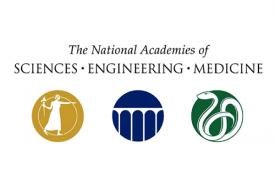-

Nominate an Expert for a National Academies Workshop on Environmental Exposure and Mental Health
The National Academies of Sciences, Engineering, and Medicine seeks experts to plan a workshop exploring the influence of environmental exposures (e.g., pollutants) on mental and behavioral health outcomes.
-
NASEM Seeking Environmental Health Committee Experts
The National Academies of Sciences, Engineering, and Medicine’s Standing Committee on the Use of Emerging Science for Environmental Health Decisions seeks experts to plan a workshop exploring the influence of environmental exposures (e.g., pollutants) on mental and behavioral health outcomes. The workshop, planned for February, 2021, will focus on efforts to better integrate mental and behavioral health into multidisciplinary considerations of environmental health; new tools and technologies to assess mental and behavioral health outcomes; and ways in which mental and behavioral health impacts could be incorporated into environmental risk assessm…
-
Persistence and Fade-Out of Educational Intervention Effects: Mechanisms and Potential Solutions
Psychological Science in the Public Interest (Volume 21, Number 2)Read the Full Text (PDF, HTML) Time-limited experiences such as educational interventions may have long-lasting effects and alter a person’s life trajectory, but in some instances, their effects are short-lived. Understanding the factors that influence and contribute to the persistence and fade-out of interventions can improve theories of human development and help to create meaningful interventions, with implications for practice and policy. In this issue of Psychological Science in the Public Interest (Volume 21, Issue 2), Drew H. Bailey, Greg J. Duncan, Flávio Cunha, Barbara R. Foorman, and David S.
-
What Makes Strangers Click?
Most of us have experienced it at least once: you meet someone, and within minutes you know you are going to be friends – or more. Often, discovering shared opinions sparks the connection; you might find you both love the paintings of Paula Rego, or that you had exactly the same reaction to today’s headlines or that you both hate the music at this party. Whatever it is, you strike up a conversation and within minutes you’re exchanging recommendations, riffing off each other’s jokes and making up stories together. Before you’ve even found out what the other person does for a living or where they’re from, you’ve established a feeling of mutual connection.
-
The Science Behind WFH Dressing for Zoom
Mina Khan, an information-technology consultant who’s been working from home in Houston since March, tried wearing sweatpants and hoodies instead of the blouses and dress pants she typically wore to the office. It didn’t work. “Eventually I shifted to dressing the way I used to before because I realized it puts me in a better mental space when I’m working,” says the 26-year-old. It turns out there’s actual science to back up that feeling. Researchers studying links between clothes, brain activity and productivity have long found that dressing up for work can improve your performance.
-
A Theory About Conspiracy Theories
More than 1 in 3 Americans believe that the Chinese government engineered the coronavirus as a weapon, and another third are convinced that the Centers for Disease Control and Prevention has exaggerated the threat of Covid-19 to undermine President Trump. The numbers, from a survey released on Sept. 21 by the University of Pennsylvania’s Annenberg Public Policy Center, may or may not taper off as communities begin to contain the virus. But they underscore a moment when a particular brand of conspiracy theory is emerging in the mainstream: A belief that the “official story” is in fact a Big Lie, being told by powerful, shadowy interests.

